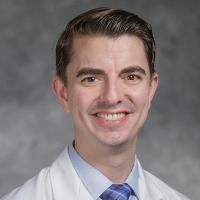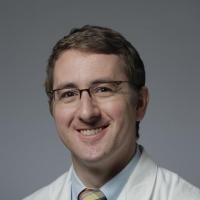Frequency and causes of QRS prolongation during exercise electrocardiogram testing in biventricular paced patients with heart failure.
Date
2020-06
Journal Title
Journal ISSN
Volume Title
Repository Usage Stats
views
downloads
Citation Stats
Attention Stats
Abstract
Type
Department
Description
Provenance
Subjects
Citation
Permalink
Published Version (Please cite this version)
Publication Info
Atwater, Brett D, Kasper Emerek, Zak Loring, Christoffer Polcwiartek, Kevin P Jackson and Daniel J Friedman (2020). Frequency and causes of QRS prolongation during exercise electrocardiogram testing in biventricular paced patients with heart failure. HeartRhythm case reports, 6(6). pp. 308–312. 10.1016/j.hrcr.2020.02.006 Retrieved from https://hdl.handle.net/10161/25533.
This is constructed from limited available data and may be imprecise. To cite this article, please review & use the official citation provided by the journal.
Collections
Scholars@Duke

Zak Loring
I am a cardiac electrophysiologist specializing in the treatment of heart rhythm disorders and management of cardiac implantable electronic devices (CIEDs). My research utilizes signal processing of electrocardiographic data and novel analytic techniques to better phenotype patients and identify those for whom interventional electrophysiology procedures may be most beneficial. This includes predicting which patients with left bundle branch block may benefit from early cardiac resynchronization therapy or conduction system pacing. I also analyze population level data to identify patients at high risk for adverse sequelae of rhythm disorders who may benefit from early intervention.

Kevin Patrick Jackson
Research interests include:
- optimization of device timing for Cardiac Resynchronzation Therapy (CRT)
- novel cardiac imaging technologies for CRT
- catheter ablation versus anti-arrhythmic drug for treatment of atrial fibrillation.

Daniel Friedman
My research areas of interest include improving the safety and efficacy of complex ablation and optimal use of pacemakers in patients with heart failure, including cardiac resynchronization therapy and conduction system pacing. I am also interested in non-pharmacologic management of atrial fibrillation, including catheter ablation and left atrial appendage occlusion, and understanding optimal use of novel and emerging technologies.
Unless otherwise indicated, scholarly articles published by Duke faculty members are made available here with a CC-BY-NC (Creative Commons Attribution Non-Commercial) license, as enabled by the Duke Open Access Policy. If you wish to use the materials in ways not already permitted under CC-BY-NC, please consult the copyright owner. Other materials are made available here through the author’s grant of a non-exclusive license to make their work openly accessible.
